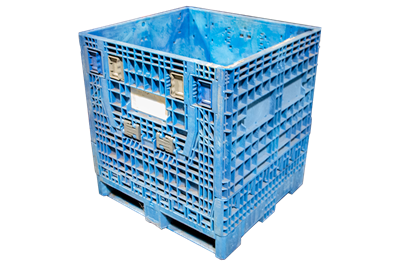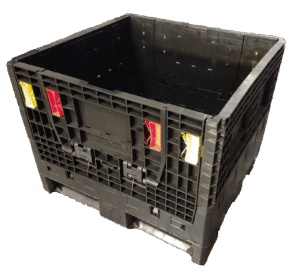The Ultimate Guide to Picking the Right Mass Containers for Your Organization Demands
Choosing the proper mass containers is critical for any kind of organization that depends on efficient logistics. Different sorts of containers exist, each created for certain products and applications. Factors such as dimension, material compatibility, and regulative requirements play a significant function in this decision-making procedure. Recognizing these components can lead to boosted functional effectiveness. Nevertheless, lots of businesses neglect important facets that might improve their general performance and sustainability. What are these considerations?
Recognizing Different Kinds Of Mass Containers
Mass containers serve as essential devices for businesses seeking efficient storage space and transportation solutions. These containers are available in different types, each developed to meet details functional needs. One typical kind is the intermediate mass container (IBC), which is excellent for fluid and granulated materials, offering a balance of ability and ability to move. Another popular option is the mass bag, or FIBC, ideal for completely dry, flowable items. These adaptable containers are lightweight and can be conveniently carried and saved. For heavier materials, stiff mass containers are commonly employed, giving durability and security for secure handling. In addition, there are customized containers tailored for hazardous products, making certain conformity with security regulations. Comprehending the distinctive features of these mass container types enables businesses to make educated decisions that enhance logistics and lower prices. By choosing the ideal container, firms can boost their operational effectiveness and streamline their supply chain processes.
Trick Product Considerations for Bulk Containers
When picking mass containers, it is vital to contemplate the products used in their building and construction. Elements such as chemical, stamina, and toughness compatibility play an important role in guaranteeing the containers satisfy specific operational requirements. Additionally, weight and mobility worries can impact both effectiveness and transportation logistics.
Product Resilience and Stamina
Resilience and toughness are vital aspects in picking products for bulk containers, as they directly influence the container's capacity to withstand different ecological conditions and dealing with procedures. Products such as high-density polyethylene (HDPE), polypropylene, and stainless steel are commonly favored for their durable buildings, using resistance to temperature level, abrasion, and influence changes. The choice of product likewise influences the total life-span of the container; more powerful materials typically lead to much less frequent replacements, leading to cost financial savings over time. Additionally, the weight of the material can impact shipping prices and convenience of handling. Companies must consider their details functional atmospheres and the capacity for damage to ensure peak toughness and stamina in their mass container option.
Chemical Compatibility Variables
Recognizing chemical compatibility is crucial for picking mass containers, as the materials made use of need to withstand the specific materials they will hold. Various variables affect compatibility, including the chemical nature of the materials, temperature level, and period of storage space. Harsh chemicals may require containers made from stainless steel or specialized plastics that withstand degradation. In addition, responsive substances can create heat or gases, requiring vented or pressure-rated containers. The choice of container material, whether steel, polyethylene, or polycarbonate, must align with the chemical residential or commercial properties of the saved materials to avoid leakages or violations. Inevitably, a detailed evaluation of these compatibility aspects guarantees safe handling and storage, shielding both workers and the environment while keeping item integrity.
Weight and Transportability Concerns
Choosing mass containers entails not only evaluating chemical compatibility however also considering weight and portability. Organizations must analyze the convenience of handling and transportation to maximize efficiency. Lightweight products like high-density polyethylene (HDPE) or aluminum can assist in much easier movement and lower shipping costs. On the other hand, larger containers might offer improved longevity but can hinder movement, particularly in atmospheres needing constant moving. Furthermore, the design of the container ought to permit hassle-free lifting and piling, making certain ergonomic safety for employees. Firms ought to likewise think about the framework available for transportation; for instance, containers compatible with forklifts or pallet jacks can streamline operations. Eventually, the right balance in between weight and transportability straight affects functional performance and price performance.
Sizing Your Mass Containers for Ideal Performance
When sizing mass containers, companies must very carefully analyze the measurements called for to fit their certain products. Furthermore, weight capacity is a critical variable that affects effectiveness and security during transport and storage space. Effective sizing not just makes best use of room however likewise enhances operational process.
Establishing Container Capacities
Selecting the right dimensions for mass containers is important for maximizing efficiency in storage space and transportation. Companies should evaluate their specific demands, taking into consideration variables such as available space, the nature of the items being kept, and the methods of transportation utilized. Precise dimensions guarantee that containers fit preferably in stockrooms and lorries, reducing wasted room and decreasing managing time. Requirement sizes can offer benefit, however personalized dimensions may be necessary for unique needs or to suit details products. In addition, it is essential to review piling abilities and accessibility, as these factors affect general functional efficiency. Inevitably, the right dimensions cause enhanced organization and structured logistics, benefiting the general efficiency of business.
Weight Capability Considerations
Understanding weight ability is important for companies aiming to maximize their mass container performance. The weight capability of a container directly impacts storage abilities, transport logistics, and overall operational expenses. Picking containers with the appropriate weight limitations guarantees that companies can securely keep and carry their products without risking damages or conformity problems. Straining containers can lead to structural failures, while underutilizing capability outcomes in lost resources. It is very important for companies to examine their product weights and consider any kind of governing needs when selecting containers. Additionally, elements such as the type of product, planned usage, and ecological problems should also affect weight ability decisions. By evaluating these components, services can boost efficiency and ensure a streamlined supply chain.
Regulative Conformity and Safety Standards

Governing conformity and safety requirements play an important duty in the option of mass containers for businesses. Organizations must guarantee that their containers fulfill numerous laws set by local, nationwide, and international authorities. These standards frequently concern product safety, structural honesty, and proper labeling, which aid stop crashes and ensure the secure transportation of products.
Additionally, adherence to industry-specific guidelines, such as those from the Food and Medicine Management (FDA) or the Occupational Security and Health And Wellness Management (OSHA), is essential for companies dealing with unsafe materials or food. Non-compliance can lead to penalties, lawful concerns, or damages to a company's credibility.
Businesses need check my source to also consider the container's compatibility with the products being kept or carried to prevent contamination or chain reaction (used collapsible bulk containers). To summarize, comprehending and carrying out governing conformity and safety and security criteria is important for the effective and liable use of bulk containers
Sustainability Options for Eco-Friendly Mass Containers

Companies are likewise exploring options made from recycled materials, which not only save sources however also support the recycling sector. Technologies in design permit for lighter containers that need less energy to transportation, even more boosting sustainability. By integrating these green mass container alternatives, businesses can demonstrate their commitment to ecological stewardship while satisfying customer demand for sustainable methods. This shift not just assists the planet yet can likewise improve brand reputation and consumer commitment.
Cost-Effectiveness and Budgeting for Bulk Containers
While several organizations concentrate on sustainability, cost-effectiveness continues to be a vital variable when picking mass containers. Organizations has to evaluate the preliminary purchase cost, in addition to lasting operational expenses, to guarantee monetary practicality. Factors such as reusability, sturdiness, and maintenance play a substantial duty in figuring out general expenses.
Purchasing find this premium containers might produce higher in advance costs however can lead to cost savings via lowered replacement rates and reduced waste. In addition, companies need to take into consideration transport prices and storage space performance, as these can affect the total budget.

Regularly Asked Inquiries
Exactly how Do I Figure Out the Right Container for Hazardous Materials?
To establish the right container for dangerous products, one should review compatibility with the material, think about the container's product, check for regulative compliance, and analyze ability and security functions to guarantee correct handling and storage space.
Can Mass Containers Be Personalized for Specific Products?
Yes, bulk containers can be tailored for details products. used plastic containers. Different functions, such as size, layout, and product, can be tailored to fulfill unique needs, making certain optimal security and efficiency for transporting and saving various goods
What Is the Typical Lifespan of Various Mass Container Kind?
The typical life expectancy of bulk container kinds varies; plastic containers last 5-10 years, steel containers 10-20 years, and wooden containers generally last 3-7 years, relying on use, upkeep, and ecological problems.
Just how Should I Tidy and Maintain Bulk Containers?
To clean up and maintain bulk containers, one should on a regular basis check for damages, get rid of residue, clean with ideal detergents, wash extensively, and warranty appropriate drying before storage space. Following supplier guidelines boosts durability and safety and security during use.
Exist Rental Choices for Bulk Containers Available?
Yes, various business provide rental options for mass containers, giving flexibility for services. These rentals can fit different needs, permitting firms to manage inventory successfully without the commitment of acquiring containers outright.
Durability and toughness are crucial variables in selecting materials for bulk containers, as they straight influence the container's capacity to stand up to numerous ecological conditions and taking care of processes. Understanding chemical compatibility is necessary for choosing Visit This Link mass containers, as the products made use of need to resist the particular compounds they will hold. Recognizing weight capability is crucial for companies intending to maximize their bulk container effectiveness. Governing compliance and safety and security criteria play an important duty in the option of mass containers for companies. While several services focus on sustainability, cost-effectiveness remains an essential aspect when picking mass containers.